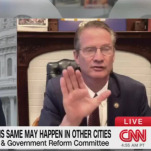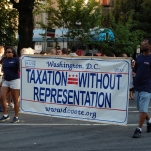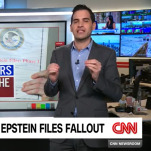Facebook Lets You Buy Political Ads as Basically Anyone, Including ISIS and Mike Pence
Among the measures Facebook brought in to respond to Russian attempts to influence the 2016 election on the platform was increased transparency around political ads bought on the platform, including making all political ads available in an online archive. Earlier this year, the company began requiring all political ads to display information about who paid for the ad—information not required on such ads by U.S. law, thanks in part to Facebook itself and Hillary Clinton campaign lawyer Marc Elias, who helped them evade FEC regulations.
But the rollout of these new rules has been rocky at best, and Vice News uncovered another flaw in the system in a story published Thursday. Their reporter, William Turton, formerly of GMG, managed to get Facebook to accept ads with “completely made up” information about who was paying for them. One ad, copied from a Russian-sponsored 2016 ad, was submitted for a page titled Ninja Turtles PAC and listed its sponsor as Mike Pence. Another ad, for Ratatouille for Senate, said it was paid for by the Islamic State. (None of the ads actually ran, but Facebook accepted them, so Vice News could have run the ads if they wanted to, and I wish they had.)
-

-

-

-

-

-

-

-

-

-

-

-

-

-

-

-

-

-

-

-

-

-

-

-

-

-

-

-

-

-

-

-

-

-

-

-

-

-

-

-

-

-

-

-

-

-

-

-

-

-

-

-

-

-

-

-

-

-

-

-

-

-

-

-

-

-

-

-

-

-

-

-

-

-

-

-

-

-

-

-

-

-

-

-

-

-

-

-

-

-

-

-

-

-

-

-

-

-

-

-

-

-

-

-

-

-

-

-











































































































